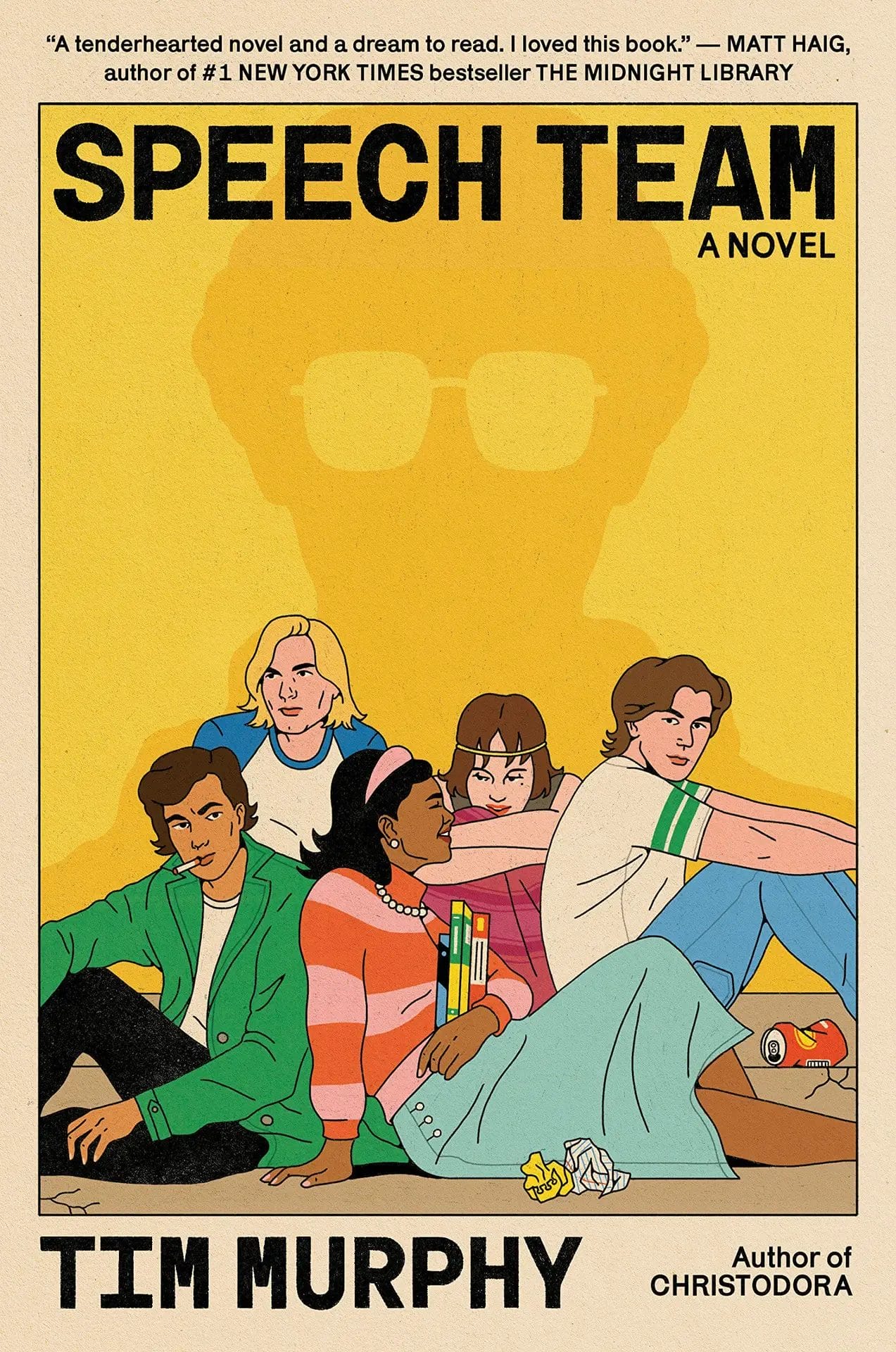

Speech Team
By Tim Murphy
A propulsive, witty, and moving novel starring four precocious Gen X teens–turned–twenty-first-century middle-agers who are seeking . . . well, if not exactly justice from a long-ago hurtful teacher, then at least some kind of long-desired reckoning and closure
Late one morning, parked in a desk chair at his humdrum job, Tip Murray finds himself reading the suicide note of his long-lost high school friend Pete Stroman. Mentioned in the note as a root cause of Pete’s despair? A disparaging comment made to him about his developmental disability by none other than their high school speech team coach, Gary Gold.
As more thorny memories surface from their eighties adolescence, Tip and his best friend, fellow speech team alum Nat Farb-Miola, decide to reconnect with their other teammates, and they discover an unsettling thread: all were quietly wounded by Mr. Gold’s deeply cutting remarks. The silver lining? Gary Gold is still alive, and a quick Google search tells the quartet that he has retired to Florida. There’s only one thing left to do: confront him.
By turns incisive and sweet, alive with the sting of wounds past and the hopeful possibility of the present, Speech Team explores what it means to take account of the pain that can suffuse a life and what it means, years on, to move forward.
My thoughts:
I received an advance copy of this book courtesy of the publisher in exchange for an honest review
I hadn’t heard a lot about this book, but since it deals with GenXers and flashbacks to high school in the 80s, I had to check it out, High school wasn’t my most favorite time in life, but I loved growing up in the 80s, and I was ready for a trip down memory lane.
“Speech Team” is told from the point of view of Thomas “Tip” Murray, a 40-something-year-old man who has struggled with alcohol and cocaine addiction but has finally settled into a somewhat ordinary life with his oncology nurse partner, Marcus.
Then one day, Tip learns that Pete Stroman, a high school acquaintance, committed suicide, and in the public note he left on Facebook, Pete mentions a negative comment that his Speech Team coach said to him that stuck with him throughout his life. While speaking with his high school friend Nat about Pete’s suicide, Tip confesses that Gary Gold – their Speech Team coach – had also said something very upsetting to him that he carried with him into adulthood.
Nat and Tip decide to reach out to a couple of other friends from high school who were also on the speech team. It’s not long before Jennifer – one of the few Black girls in their high school, and Anthony, another gay kid from Mendhem High – confess that they, too, had harmful and hurtful things said to them by Gary Gold that negatively impacted their lives. It’s only a short time before the four former classmates have tracked down Gary and booked a trip to Florida to confront him.
The book invites us to relive the vibrant and sometimes painful moments of adolescence in the 80s. As we journey alongside the characters, we witness how profoundly a disparaging comment impacted each team member’s life. The wounds caused by Mr. Gold’s hurtful remarks serve as a catalyst for self-discovery, personal growth, and, ultimately, an opportunity for healing.
One of the notable strengths of “Speech Team” is its exploration of the power of forgiveness. As the characters set out to confront Mr. Gold in Florida, they realize that while their grievances are valid, harboring resentment only perpetuates their own suffering. Through heartfelt conversations, honest introspection, and a cathartic confrontation, Murphy illustrates the transformative power of letting go, reminding us all of the importance of forgiveness in our own lives.
I loved all of the eighties references, and I also really enjoyed the diversity of the characters. Each speech team member brings their unique personality and struggles to the story, creating a rich tapestry of experiences. From the shy and introverted to the bold and outspoken, Murphy has crafted a group of characters that feel like real people we might encounter in our own lives. I especially connected with Tip. While I was never a drug addict or an alcoholic, I did experience some of the bullying he experienced in high school. There is also a point in the book where he mentioned that Gold (the Speech team coach) “saw him” when Gold told Tip to stop being so obviously gay, and how that hurt him because what he hoped for was for someone to see him for who he truly was and to love him for it rather than condone him.
I appreciated how each character got some sort of closure – even if it wasn’t in the way they’d hoped. I also appreciated that it ended realistically rather than everything being tied up in a pretty little bow. If you’re looking for a well-written, quick read with a punch, I highly recommend this one.
Genre(s):
Other Bookish Tags:













